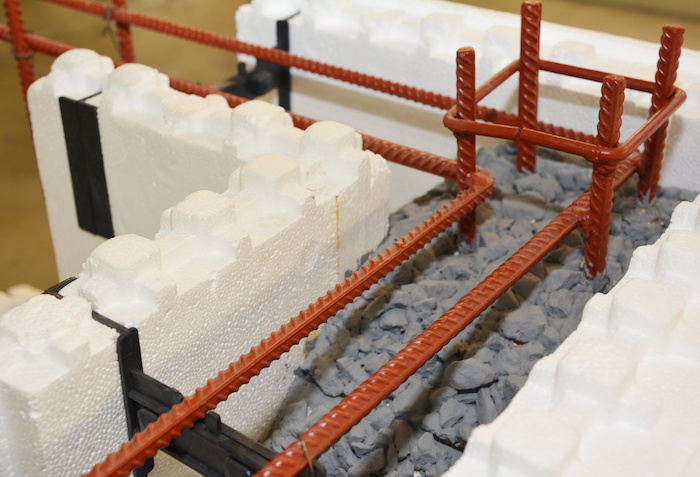
Insulated Concrete Forms (ICFs) are hollow foam blocks stacked into a building’s exterior wall shape, strengthened with steel rebar, and filled with concrete. It combines Expanded Polystyrene, a fine insulating material, with steel-reinforced concrete, a strong structural building material. This creates a wall system of unrivaled energy efficiency, comfort, noise reduction, and strength.
ICF construction offers thermal and structural components of a wall. The walls are adequately insulated, durable, and inherently tight. The foam reduces thermal bridging and offers coherent thermal performance. The concrete ensures airtight walls. Additionally, ICF walls are highly fire and wind-resistant and easy to install. Here’s a comprehensive guide to ICF construction.
How much does ICF construction cost?
ICF construction costs around $150 and $160 per square foot. Note that concrete prices fluctuate, and your home’s price also depends on the design, construction labor costs, location, materials, project complexity, and other factors. Remember that the time needed to compile the required permits for ICF projects is likely longer than for conventional homes because the process can be quite arduous.
How long does an ICF building last?
ICF buildings have an over 100 years lifespan and require minimal maintenance because the foam doesn’t degrade. The walls are solid enough to withstand hurricane tornadoes and winds, fire, and earthquakes. They’re less likely to experience slow degradation, meaning they can stand the test of time. For your construction to last long enough, consider partnering with experienced builders of integrity, such as Excel Builders, and ensure their packages have warranties to protect your home from disaster.
Finishing an ICF home
Drywalls are screwed into the ICF’s plastic strips, letting your home be finished and plastered like conventional homes, including paint, siding, drywall, carpets, and more. You can use anything you like for your interior finishes.
Advantages of ICF construction
ICF construction has multiple benefits over traditional construction methods, particularly in wood-frame buildings. They include:
1. Tight construction
Constructions usually leak at the various building component joints. Walls have many such joints. However, an ICF wall structure doesn’t let in moisture or air infiltration. Intact moisture and air barriers are a vital modern energy-efficient construction prerequisite that an ICF system creates. These vapor and air barriers result in healthy, high-performing buildings. Thanks to the tight construction, the air inside becomes cleaner, and less noise penetrates through the walls.
2. Acoustic insulation
Traditional construction processes usually consider soundproofing as an afterthought, but ICF naturally provides acoustic insulation. The blocks used in insulated concrete forms result in thick, strong walls that don’t let noise permeate. These blocks are ideal for residential constructions where tranquility is vital and commercial buildings like movie theaters where soundproofing is crucial for the building’s functioning.
3. Strong construction
ICF constructions are reinforced with concrete, making them last longer. Since the plastic insulation doesn’t settle or degrade over time, the building shell doesn’t lose its strength or efficiency. ICF buildings can withstand natural disasters and are fire-resistant, resulting in lower insurance costs. To make the home more disaster-resistant, you can add a well-anchored and fireproof roof to the building, plus metal shutters and impact-resistant windows where suitable.
4. Design flexibility
Longer, clear large room spans are easy to design as the concrete walls carry the steel beam loads these designs need. Conventional building exterior finishes usually require vapor barriers. However, ICF constructions have built-in vapor barriers, so there won’t be extra work. It’s also easier to add exterior finishes to any unusual shapes you have.
5. Energy efficiency
ICF constructions are energy-efficient due to the little exterior air interchange. The buildings are drafts-free, increasing comfort. Since ICF buildings are well insulated and tight, their energy costs are usually lower. For more energy cost savings, you can install excellent attic insulation, air-seal the attic, and use energy-efficient doors and windows. Additionally, the EPS foam insulation, which is continuous inside and out, enhances the ICF building’s energy efficiency.
Disadvantages of ICF construction
1. Difficult remodeling
ICF buildings are hard to remodel. This is why you should consider your property’s design and anticipate the changes you may want in the future. You should also account for the plumbing and electrical chases you require, as including them after construction may require you to cut into the concrete.
2. It takes up floor space
ICF constructions have multiple inches of reinforced concrete and foam insulation, meaning they need more space than wood frame walls. If constructing a smaller home, the amount of indoor space required for the ICF construction might be an issue.
3. Insect and water issues
If you use polystyrene for your ICF construction, groundwater and insects can enter walls via the exterior foam insulation. However, using foam blocks treated with insecticides and ensuring they’re waterproof can help address this issue.
Endnote
ICF constructions are superior to wood-frame buildings. They give you more comfort and increased energy efficiency. ICF constructions can also withstand natural disasters, making them an excellent construction option.
